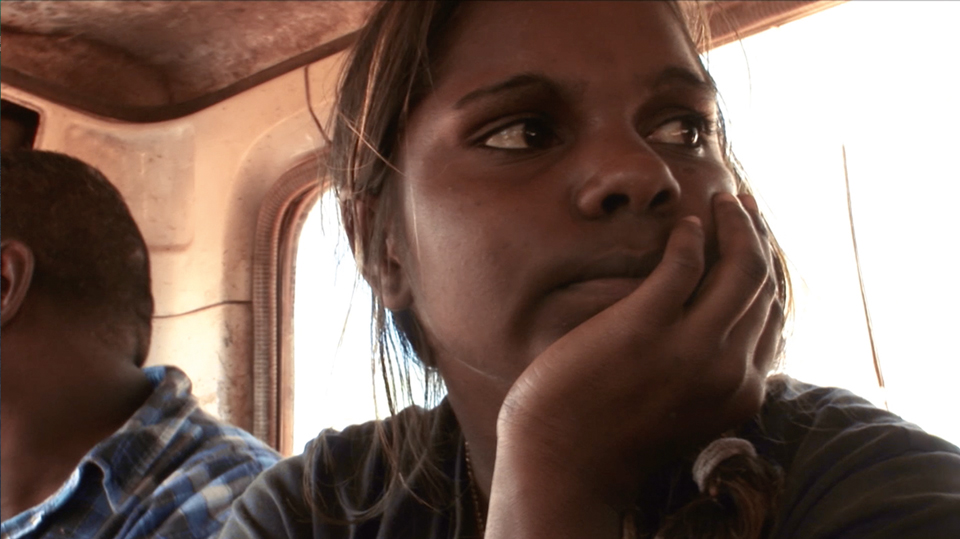AUS 2014 | Directors: Karrabing Film Collective | Colour | DCP | 34 min | english OV | Arsenal – Institut für Film und Videokunst
As a group of Indigenous adults argue about whether to save their government housing or their sacred landscape, their children struggle to decide how the ancestral Dreaming makes sense in their contemporary lives. Listening to music on their ipods, walking though bush lands, and boating across seas, they follow their parents on a journey to reenact the travel of the Dog Dreaming. Along the way individuals run out of stamina and boats out of gas, and the children press their parents and each other about why these stories matter and how they make sense in the context of Western understandings of evolution, the soundscapes of hip hop, and the technologies of land development. WHEN THE DOGS TALKED mixes documentary and fiction to produce a thoughtful yet humorous drama about the everyday obstacles of structural and racialized poverty and the dissonance of cultural narratives and social forms. (www.karrabing.info)

| Acronyms | |
|---|---|
| amer. | American English |
| b/w | Black and white |
| OV | Original version |
| SUB | Subtitles |
| +SUB | electronic live subtitling (below the image) |
| INT | Intertitles |
| Countries | |
|---|---|
| AT | Austria |
| FRG | Federal Republic of Germany (historic) |
| BLR | Belarus |
| DE | Germany |
| CAN | Canada |
| GDR | German Democratic Republic (historic) |
| EGY | Egypt |
| FR | France |
| GB | Great Britain |
| URY | Uruguay |
| BRA | Brasil |
| SWE | Sweden |
| UKR | Ukraine |
| PL | Poland |
| IDN | Indonesia |
| PRT | Portugal |
| HRV | Croatia |
| ECU | Ecuador |
| HUN | Hungary |
| AUS | Australia |
| IT | Italy |
| MEX | Mexico |
| IND | India |
AUS 1978 | Director: Essie Coffey | Camera: Martha Ansara | Editor: Kit Guyatt | Music: Essie Coffey, Fred Edgar, Zac Martin | Colour | DCP | 49 min | aboriginal english OV with english SUB | National Film and Sound Archive of Australia
Born in 1941, Essie Coffey was a Muruwari activist and filmmaker who established the Aboriginal Legal Service of Western Australia in the early 1970s and was an inaugural member of the Council for Aboriginal Reconciliation in the 1990s. MY SURVIVAL AS AN ABORIGINAL is an autobiographical film in which Coffey recounts the entwined stories of herself and her people, drawing attention to dispossession ad marginalization while affirming strength and resilience. When asked about her intended audience for the film, Coffey answered that it was "for everyone, but primarily for Indigenous people, to give them back their identity and to show them how they can survive as a people today." ("No Master Territories" exhibition brochure, HKW 2022)
"In her voiceover narration, Coffey frequently posits her individual figure within the larger social group of Black Aboriginal people through the use of personal and possessive pronouns, such as “My” “People” and “We”, which point to an enunciative condition of plurality. Coffey’s voiceover (…) seeks to produce a filmic knowledge which is both individual and collective." (R.P. Chaves, G.K. Soundelo, D.M. Williams, Studies in Documentary Film, 2020)
Courtesy of the National Film and Sound Archive of Australia

| Acronyms | |
|---|---|
| amer. | American English |
| b/w | Black and white |
| OV | Original version |
| SUB | Subtitles |
| +SUB | electronic live subtitling (below the image) |
| INT | Intertitles |
| Countries | |
|---|---|
| AT | Austria |
| FRG | Federal Republic of Germany (historic) |
| BLR | Belarus |
| DE | Germany |
| CAN | Canada |
| GDR | German Democratic Republic (historic) |
| EGY | Egypt |
| FR | France |
| GB | Great Britain |
| URY | Uruguay |
| BRA | Brasil |
| SWE | Sweden |
| UKR | Ukraine |
| PL | Poland |
| IDN | Indonesia |
| PRT | Portugal |
| HRV | Croatia |
| ECU | Ecuador |
| HUN | Hungary |
| AUS | Australia |
| IT | Italy |
| MEX | Mexico |
| IND | India |
Followed by a conversation via Zoom with camerawoman Martha Ansara






